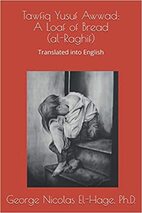Tawfiq Yusuf Awwad: A Loaf of Bread (al-Raghif)
The events of this book rotate around The First World War (1914 – 1918) and focus on three major points: starvation in Lebanon, the martyrs who were hung on the orders of the Turkish Commander Jamal Pasha, better known as “The Butcher”, and the revolution which the Arabs led against the Turks. Critics agree that al-Raghif is one of the masterpieces of the Arabic novel. Immediately after its first publication in 1939, it was hailed as a major event in the history of Arabic literature particularly in the genre of the novel because it stood as a landmark between what preceded it and the new trend that it charted. Before al-Raghif, the Arabic novel was merely a dull and dreary historical narrative at the beginning of the twentieth century, permeated with boring moral preaching and failed attempts to imitate Western novels, but with the publication of al-Raghif, the Arabic novel acquired a new life and attained new heights of super artistic creativity in both style and content. For the first time after the publication of al-Raghif, Western Orientalists began to pay attention to the Modern Arabic novel, and they hailed this book as a “pioneering event in the history of Modern Arabic Literature.” Furthermore, this novel is considered a major “reference” by European and American Orientalists that documents a foremost critical period on both the national and the literary scenes, not only in Lebanon, but also in the rest of the Arab East. The celebrated Arab-Lebanese female writer and critic May Zeyadeh summed it best when she explained that no other Arab author was able to historically document the catastrophic tragedy which inflicted her homeland like Tawfiq Yusuf Awwad did in his masterpiece al-Raghif. She added that it feels that this gifted author has personally lived this tragedy and endured it for the rest of us. He not only endows the characters and other beings, including non-living entities, with a life of their own, but he also feels their life and lives it with all its tragic possibilities -- emotionally, artistically, and as humanly as possible, and he expresses all this in an elevated style and a sublime and noble sentiment. It can also be argued that al-Raghif is a purely literary work and not an historical document and that its characters, depictions, and national implications and humanitarian reach are all the creation of the author. Here we tend to agree with Rushdie al-Maalouf that Tawfiq Yusuf Awwad combines in his art the sensitivity of the poet, his comprehensiveness and idealism, with the deep and meticulous observation of the social historian and his profound conclusions. Awwad is the gifted artist-writer who can elevate us in the world of art and transport us from the reality of “What is” to the endless possibility of “What could possibly be.”

